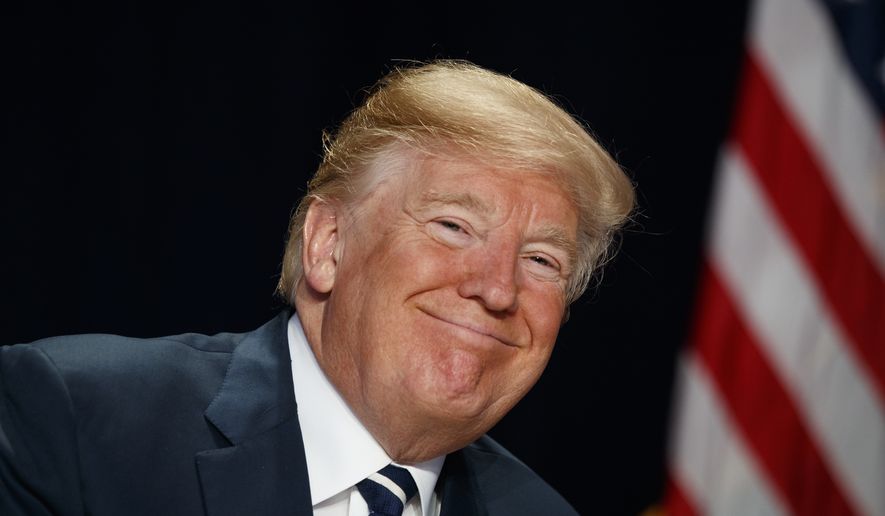The House intelligence committee has finished its Russian election-meddling investigation with a draft report concluding there was no collusion or coordination between Donald Trump’s 2016 presidential campaign and the Kremlin, according to GOP panel members.
“The bottom line: The Russians did commit active measures against our election in ’16, and we think they will do that in the future,” Rep. Mike Conaway, Texas Republican and one of the probe’s leaders, said late Monday on Capitol Hill.
While the Texas Republican said panel members agreed with conclusion of leading U.S. intelligence agencies that Russia had interfered with the election — he added that they disagreed “with the narrative that they were trying to help Trump.”
“We found no evidence of collusion,” Mr. Conaway said. “We found perhaps some bad judgment, inappropriate meetings. But only Tom Clancy or Vince Flynn or someone else like that could take these series of inadvertent contacts with each other, meetings, whatever, and weave that into some sort of a fiction and turn it into a page-turner, spy thriller.”
Late Monday on Twitter President Trump welcomed the release. “THE HOUSE INTELLIGENCE COMMITTEE HAS, AFTER A 14 MONTH LONG IN-DEPTH INVESTIGATION, FOUND NO EVIDENCE OF COLLUSION OR COORDINATION BETWEEN THE TRUMP CAMPAIGN AND RUSSIA TO INFLUENCE THE 2016 PRESIDENTIAL ELECTION,” he wrote.
Democrats will receive the Republican majority’s 150-page draft report — which includes more than 20 recommendations on election and cybersecurity safety — on Tuesday for review and comment, Mr. Conaway added, noting the committee overall interviewed 73 witness, held nine hearings and briefings, and reviewed more than 300,000 documents.
The public will not see the report until the intelligence community has decided what sensitive information can become public, a process that could take weeks.
But the committee is so divided along party lines that Democrats are expected to issue a separate report with much different conclusions.
Last week Republicans hit the brakes hard on the probe, saying it had reached the end of its usefulness and accusing Democrats of dragging it out so it hangs over the upcoming midterm elections.
Democrats countered that the inquiry was far from over and insisted that more issues required clarification, hammering Republicans for failing to use subpoenas to push recent witnesses to answer questions they charged were central to the investigation.
Late Monday the panel’s top Democrat reacted to the announcement of the probe’s conclusion by lashing out at Republicans for caving in to pressure to stop investigating a GOP president.
“The House Majority has announced it is terminating the Russia investigation, leaving to others the important work of determining the full extent of Russian interference in our election, the role of U.S. persons connected to the Trump campaign in that intervention, possible efforts to obstruct the investigation by the president, and most important, what needs to be done to protect the country going forward,” said Rep. Adam Schiff, California Democrat.
“It is nonetheless another tragic milestone for this Congress, and represents yet another capitulation to the executive branch,” Mr. Schiff added. “By ending its oversight role in the only authorized investigation in the House, the Majority has placed the interests of protecting the president over protecting the country, and history will judge its actions harshly.”
House Democratic Caucus chairman, Rep. Joe Crowley added in a late statement, “This announcement strains credulity. The Republicans on the House Intelligence Committee never launched a genuine investigation to begin with, so we can hardly be expected to take their conclusions seriously. The American people want and deserve the facts, which is why Special Counsel Robert Mueller’s investigation must be allowed to continue independently.”
Last year the committee erupted in partisan battle after chairman Rep. Devin Nunes visited the White House without other committee members and reviewed information which alleged that Obama-era national security officials had spied on the Trump campaign.
The ensuing controversy saw the California Republican step aside from leading the panel’s Russia investigation until last December.
In recent weeks, the committee’s internal dysfunction grew even wider as national headlines followed Democrats and Republicans issuing dueling memos over alleged Justice Department and FBI abuses at the nation’s secret surveillance court when securing warrants to spy on Trump campaign personnel.
Democrats countered the charges were an attempt to smear special counsel Robert Mueller’s investigation of Russian meddling in the 2016 election.
During the fracas news even surfaced that the panel was considering building a physical wall in the committee’s office to separate GOP and Democratic aides.
With the close of the House probe, the Capitol Hill spotlight now heats up on the Senate intelligence committee — which has thus far conducted a more unified investigation. Its leadership said it soon expects to start issuing periodic reports containing cybersecurity recommendations aimed at keeping Russian influence out of the upcoming 2018 midterm elections.
• This article is based in part on wire service reports.
• Dan Boylan can be reached at dboylan@washingtontimes.com.




Please read our comment policy before commenting.